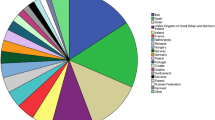Abstract
To ascertain the knowledge, awareness, and practices pertaining to celiac disease (CD) among the Indian pediatricians. A survey link containing a questionnaire was shared through electronic mail using a pediatric database. The survey was kept active for 6 months; all responses received at the end of the survey were analyzed. Two hundred and seventy one pediatricians out of more than 10,000 chose to respond to the survey. Most pediatricians agreed that more patients with CD are being diagnosed than earlier. The reasons for higher detection of CD were perceived to be higher index of clinical suspicion by pediatricians (86.7%) followed by increased awareness among parents (45.8%). Most pediatricians opined that clinical manifestations which prompted to a diagnosis of CD were failure to thrive (96.2%) and chronic diarrhea (81.4%). Knowledge about atypical manifestations of celiac disease was low. Though knowledge about the common association of CD with type 1 diabetes (62.1%) and autoimmune hepatitis (55.8%) was there, awareness about its association with other uncommon conditions was lacking. Though 68% of the pediatricians were of the opinion that the confirmation of diagnosis by a mucosal biopsy is necessary, 26.5% of respondents believed that only a positive serology was sufficient for a diagnosis. A trial of gluten-free diet (GFD) was thought to be a logical step if serology was positive by 31.3% of respondents. While 87.7% of pediatricians advocated lifelong adherence to GFD, 12.3% felt that GFD could be discontinued in the future. This web-based survey revealed that though pediatricians are seeing increasing number of celiac disease patients, there is a need to increase awareness regarding the disease, its associated conditions, the need for mucosal biopsy to confirm the diagnosis and the necessity of lifelong adherence to GFD.

Similar content being viewed by others
References
Makharia GK, Verma AK, Amarchand R, et al. Prevalence of celiac disease in the northern part of India: a community based study. J Gastroenterol Hepatol. 2011;26:894–900.
Puri AS, Garg S, Monga R, Tyagi P, Saraswat MK. Spectrum of atypical celiac disease in north Indian children. Indian Pediatr. 2004;41:822–7.
Sharma A, Poddar U, Yachha SK. Time to recognize atypical celiac disease in Indian children. Indian J Gastroenterol. 2007;26:269–73.
Makharia GK. Where are adult Indian celiacs? Trop Gastroenterol. 2006;27:1–3.
Catassi C, Cellier C, Cerf-Bensussan N, et al. When is a coeliac a coeliac? Report of a working group of the United European Gastroenterology Week in Amsterdam, 2001. Eur J Gastroenterol Hepatol. 2001;13:1123–8.
Husby S, Koletzko S, Korponay-Szabo IR, et al. European Society for Pediatric Gastroenterology, Hepatology, and Nutrition guidelines for the diagnosis of coeliac disease. J Pediatr Gastroenterol Nutr. 2012;54:136–60.
Rubio-Tapia A, Hill ID, Kelly CP, Calderwood AH, Murray JA. ACG clinical guidelines: diagnosis and management of celiac disease. Am J Gastroenterol. 2013;108:656–76.
Murch S, Jenkins H, Auth M, et al. Joint BSPGHAN and Coeliac UK guidelines for the diagnosis and management of coeliac disease in children. Arch Dis Child. 2013;98:806–11.
Ludvigsson JF, Leffler DA, Bai JC, et al. The Oslo definitions for coeliac disease and related terms. Gut. 2013;62:43–52.
Downey L, Houten R, Murch S, Longson D. Recognition, assessment, and management of coeliac disease: summary of updated NICE guidance. BMJ. 2015;351:h4513.
ICMR Guideline on Diagnosis and Management of Celiac Disease in India. Indian Council of Medical Research, 2016.
Zipser RD, Farid M, Donald B, Patel B, Patel D. Brief report: physician awareness of celiac disease. J Gen Intern Med. 2005;20:644–6.
Poddar U, Thapa BR, Singh K. Clinical features of celiac disease in Indian children: are they different from the West? J Pediatr Gastroenterol Nutr. 2006;43:313–7.
Bhat AS, Chaturvedi MK, Saini S, et al. Prevalence of celiac disease in Indian children with down syndrome and its clinical and laboratory predictors. Indian J Pediatr. 2013;80:114–7.
Cranney A, Zarkadas M, Graham ID, et al. The Canadian celiac health survey. Dig Dis Sci. 2007;52:1087–95.
Assiri AM, Saeed A, Saeed E, et al. Assessment of knowledge of celiac disease among health care professionals. Saudi Med J. 2015;36:751–3.
Vieira C, Matos M, Quaresma T, et al. What do Brazilian pediatricians know about celiac disease? Dig Dis Sci. 2011;56:799–804.
Shergill S, Makharia GK. Awareness about celiac disease amongst physicians. Indian J Gastroenterol. 2017;36:327–9.
Author information
Authors and Affiliations
Contributions
IM: analyzed the data and drafted the manuscript
KK: collected data, reviewed the manuscript for intellectual content
HH: prepared the questionnaire, shared the link for the survey, and collected the data and reviewed the manuscript
VB: conceptualized the study and reviewed the manuscript for submission
AS: reviewed the manuscript for final submission
SM: reviewed the manuscript for submission
Corresponding author
Ethics declarations
Conflict of interest
IM, KK, HH, VB, AS, and SM declare that they have no conflict of interest.
Research involving human participants and/or animals
This was a questionnaire-based study for physicians and did not involve any human or animal participants.
Informed consent
The framework of the study does not warrant an informed consent though participant’s willingness to answer the questionnaire was considered as consent.
Disclaimer
The authors are solely responsible for the data and the content of the paper. In no way, the Honorary Editor-in-Chief, Editorial Board Members, or the printer/publishers are responsible for the results/findings and content of this article.
Additional information
Publisher’s note
Springer Nature remains neutral with regard to jurisdictional claims in published maps and institutional affiliations.
Rights and permissions
About this article
Cite this article
Malik, I., Kumar, K., Hussain, H. et al. Celiac disease: What the Indian pediatricians know about the disease. Indian J Gastroenterol 38, 263–267 (2019). https://doi.org/10.1007/s12664-019-00958-3
Received:
Accepted:
Published:
Issue Date:
DOI: https://doi.org/10.1007/s12664-019-00958-3




